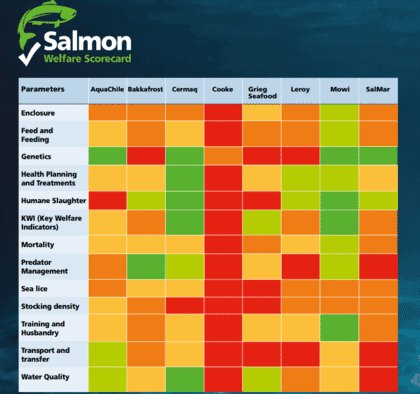
© Compassion in World Farming
Compassion in World Farming has announced the development of the salmon welfare scorecard to allow producers the ability to report authoritatively on salmon welfare and provide a basis for rewarding better policy and practice; all with the aim of improving the welfare of farmed salmon.
In recent years, public awareness about animal welfare, sustainability and healthy food has increased, and many people have turned to eating more fish as a substitute for red meat. This rise in demand for seafood has led aquaculture to being the world’s fastest-growing food sector, producing $265 (€241.6) billion worth of goods in 2020.
With over half the seafood consumed being farmed, and more than 400 million salmon raised globally each year, Compassion explains that the scorecard will help to counter longstanding challenges such solid welfare-oriented solutions for addressing stocking densities, mortality rates from sea lice infestations, and the lack of mental stimuli for salmon reared in barren environments.
Scorecard design
The organisation highlights that the scorecard has evaluated the public policies of eight salmon producers in their transparent reporting of key welfare issues, which together represent more than 50 percent of worldwide salmon production. These are based on assessments made from publicly available company information, rated across 13 welfare parameters - including stocking density, humane slaughter, sea lice infestations and mortality. Each parameter is marked independently with the resultant comparison table being based on a five-colour scale, from red to green.
According to Compassion, all the producers included were consulted about the scorecard’s original findings in March 2023 and had the opportunity to improve their scores by updating any publicly available information prior to publication, as well as being offered private, dedicated meetings with the charity’s food business team to discuss how to make welfare improvements.
The organisation noted that certain companies stood out in the scorecard’s ratings for specific parameters. Bakkafrost was reportedly the only producer that performed well for predator management, while Mowi and Cermaq did so for the key welfare indicator section and for their policies on humane slaughter. In 2022, Mowi received a Special Recognition Award from Compassion in recognition of their global policy of using a stun-kill percussive system for 100 percent of their salmon, across all countries, to ensure they are humanely killed.
Preliminary scorecard findings
Compassion also claimed that while there are some examples of good practices, and engagement has driven positive change in the communication of producers such as Mowi, Cermaq and Aquachile, the scorecard results demonstrated that there is still a long way to go. Policy reporting around transfer and transport, stocking density and enclosure (ie rearing systems and environmental enrichment) all remain very much in the red/orange colour scale across the board, the organisation reported.
According to Compassion, messaging around humane slaughter is an area where communication could be improved, while they also see sea lice policies as an area of ongoing concern.
Compassion in World Farming’s global CEO, Philip Lymbery, said in a press release: “The salmon welfare scorecard is a valuable tool for encouraging greater awareness, transparency and investment in higher salmon welfare.”
The scorecard will be updated again next year to allow for deeper engagement over the coming months with producers and Compassion is planning to publish the next iteration in November 2024, which will include more producers. After this the scorecard will be published every two years.




